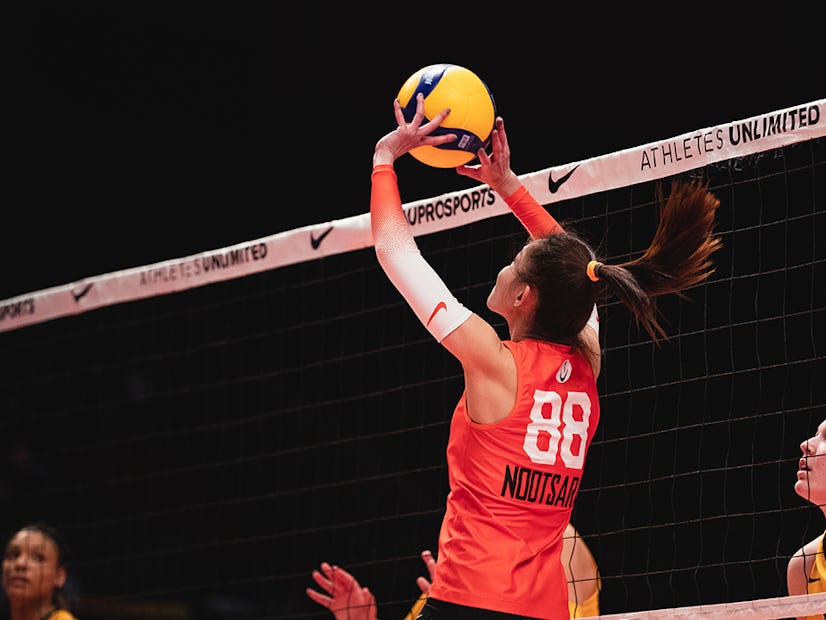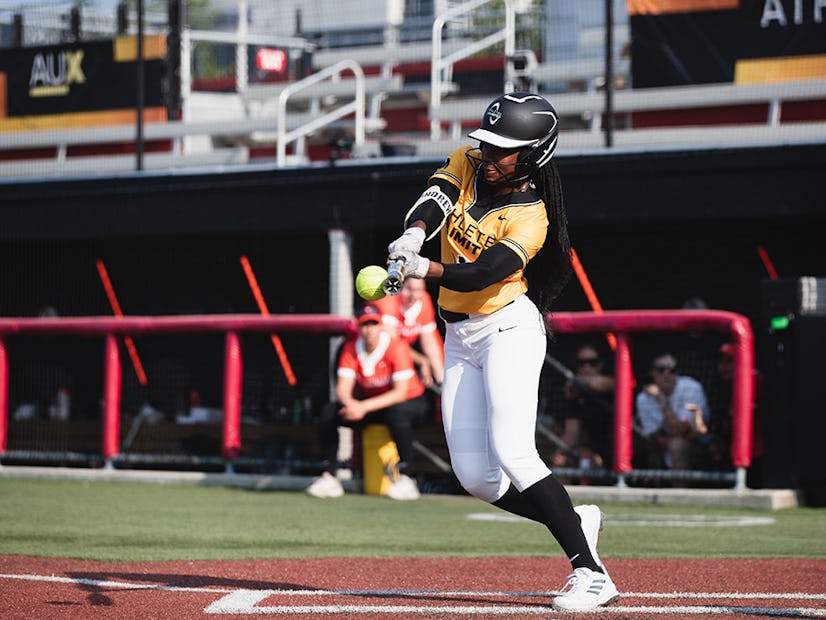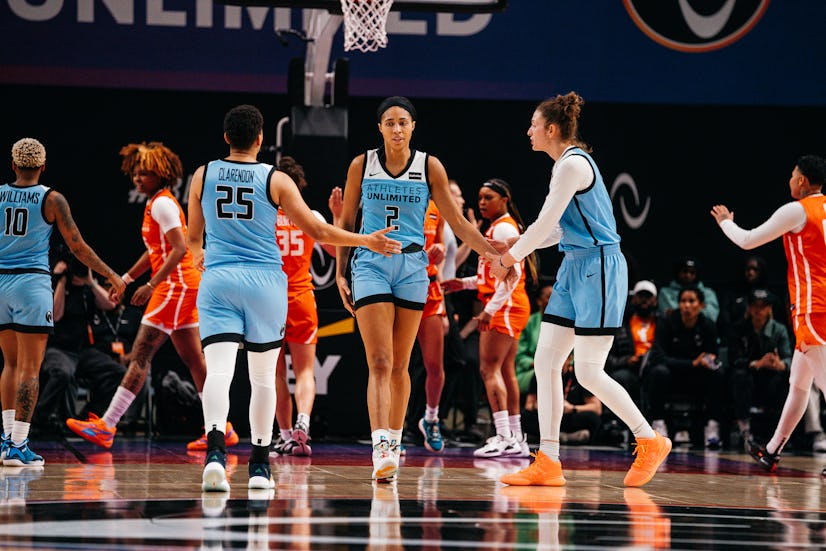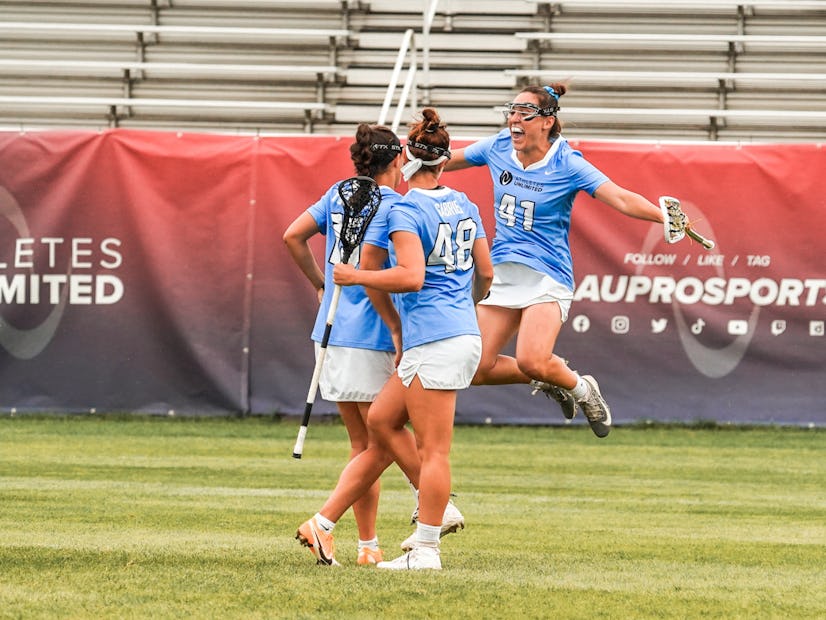
Athletes Unlimited Volleyball unites homegrown legends and international stars on US soil
Looking back, the park outside of 30th street station in the heart of Philadelphia was probably an unusual place to hold a meeting so important to the history of volleyball and Athletes Unlimited.
To an unsuspecting bystander it might have simply looked as if three friends were enjoying the mid-October sun on that afternoon in 2019, but in reality Jon Patricof and Jonathan Soros, the co-founders of Athletes Unlimited and Jamie Davis, the CEO of USA Volleyball, were finalizing the details that would see volleyball become the second-ever league within Athletes Unlimited.
“We saw Jamie and sat in the public, in the median of the road outside of the train station,” Patricof said. “Just a couple of chairs and tables. We had a two hour meeting and talked about the details of our arrangement and the league.”
While professional volleyball has blossomed internationally, creating a successful homegrown league has always been evasive to those who have made attempts. Yet, this hadn’t dampened the hopes of volleyball players Stateside, and when Davis started at USA Volleyball in 2017, it was a top priority, one that collided with the ambitions of Patricof and Soros to create an innovative approach to team sports.
“We are the greatest sporting nation in the world,” Davis said. “We have huge, successful leagues in MLB, NBA, NHL, yet for volleyball we have nothing. In the U.S., volleyball is the number one girls team sport in high school. More girls play volleyball than any other sport. That stat is exactly the same in college. In the NCAA more women play volleyball than any other team sport. With that pipeline it’s crazy to me that at the professional level we don’t have that platform.”
Davis had begun vetting proposals for professional leagues almost since the beginning of his tenure, but something about Patricof and Soros stood out to him. “When Jon reached out, he explained their plans and that they really had a vision to bring these professional leagues to the U.S., be successful and be athlete-centric.”
Not just that, but he had confidence in the way Patricof and Soros approached their work. “These guys are serious about it, investing money in it, I know they’re not cutting corners,” he said. “I think we would be making history in the U.S. by being able to finally get it.”
The train station meeting was, in fact, the culmination of a process that began almost a year earlier with Patricof and Soros dreaming together, both trying to conceive of a more thoughtful approach to professional sports and fandom in the modern age.
“We spent a lot of time early on working on our mission, our vision and our value statements… Things we couldn’t necessarily see a tangible business result from, but they guided us,” Patricof said.
By the time they were introduced to Davis, after finding him on LinkedIn, Patricof and Soros knew their top priority was getting athletes to take a chance on their sometimes unorthodox approach like the individual scoring component and having no set teams.
Davis knew the answer: Karch Kiraly.
The only volleyball player in United States Olympic history to earn three gold medals, competing in both beach and indoor, Kiraly has been head coach of the U.S. Women’s National Volleyball Team since 2012. If there was anyone who knew how players were likely to react to an idea like Athletes Unlimited, thought Davis, it was Kiraly.
Immediately, Kiraly sensed they were onto something.
“I think one thing that made it different is they acknowledged, from the start, that plenty of people have tried plenty of approaches to this and those approaches have failed and we would be crazy to try a very similar approach,” Kiraly said. “We’re trying something very different.”
That didn’t mean Kiraly thought it was a guaranteed hit. “I was very skeptical at first because volleyball is one of the quintessential team sports,” he said. But, he was on board with experimenting. “Something radically different needs to be tried because standard formulas did not work,” he said.
A green light from Kiraly, even one tempered with skepticism, felt great. But the real verdict would rest with the athletes. A volleyball league would be nothing without buy-in from the brightest stars and top talent. So, Davis arranged a meeting in Anaheim, Calif. with some of the best volleyball players in the United States to express the vision Patricof and Soros had of creating an innovative, professional women’s volleyball league.
Elite players are the lead
“Going to Anaheim and meeting with the players was a big moment,” Patricof said. “We felt like we had got an incredible audience with some of the top players.”
After a national team practice, the Athletes Unlimited team met with a group Davis had assembled that included elite volleyball players ranging from seasoned vets to rising talent. Not only were the players some of the most capable athletes on the court, but they all had impassioned ideas on how to improve their sport outside of game day. Pulling these athletes into the vision was crucial — nothing could succeed without them.
They knew convincing players to try something new wouldn’t be easy. “There’s a robust market for these people to play internationally. There’s a much greater challenge in determining if we’d be able to field the highest quality athletes in the sport,” Soros said. But they walked away from the meeting in Anaheim with a sense of optimism.
“Generally speaking, there was a real appetite to see professional volleyball in the United States,” he said. “A real desire to think about not having to travel overseas every year.”
In the end, this was one of the elements that tipped the balance for their first big signing, two-time Olympic medalist Jordan Larson.
“From a young age, I wanted to be an Olympian, but I didn’t know what that entailed,” she said. “I didn’t realize it meant seven to eight months overseas away from family. Now, maybe that doesn’t have to be.”
Larson put her weight behind the endeavor, joining the Advisory Board, and becoming a member of the Volleyball Player Executive Committee and recruiting top athletes to join.
“It was clear that she was interested in this as someone who wanted to play,” Patricof said. “But it was also clear she wasn’t just joining the league to be a player, she saw this as an opportunity to change the game and build something in the U.S.”
“To have Jordan commit was a real threshold moment,” Soros said. “We got a sense that this is going to now attract attention from other players, that great players are going to be there.”
Larson began building interest among athletes. “It’s been important to try to recruit the highest athlete, whether that’s an Olympian or people who have played at higher levels overseas,” she said.
Yet just when momentum seemed to be building, the COVID-19 pandemic hit, which meant the postponement of the Tokyo Olympic Games. While the inaugural Athletes Unlimited Volleyball season was originally scheduled to be the year following the Olympic Games— typically a slower year for athletes— the rescheduling meant it was now in the year preceding the games— the most competitive year for athletes.
“It changed the dynamic,” Soros said. “We were back to the chicken and egg problem.”
While it would have been easy for Larson to back out, opting to stick with her tried and true method for Olympic preparation, she decided to press forward with Athletes Unlimited. “The fact that it is a new challenge is a good thing for me,” she said. “I’m putting myself in an uncomfortable situation, that adds a level of difficulty.”
‘I’m constantly pushing the envelope in, ‘How do I get better?’ You’re seeing that from Jonathan and Jon, also,” she said. “They’re asking questions about what they don’t know in the volleyball realm. They’re constantly pushing the envelope themselves.”
From a park in Philadelphia to becoming a crucial part of Olympic preparation, Athletes Unlimited Volleyball’s beginnings have catapulted it to a place of major importance within the volleyball world, before a single game has been played. All there’s left to do is hit the court in Dallas, Texas on Feb. 27.
“It’s definitely different but I think that’s what’s made it unique,” said Larson. “I think the curiosity of it will be really exciting.”




